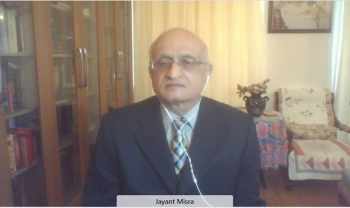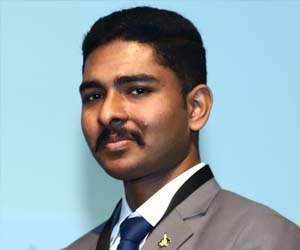On the 11th of October 2021, the Vivekananda International Foundation (VIF) as part of its Vimarsh Dialogue series organised a presentation by Shri Jayant Misra, IRS (Retd) and former Chairman of the Settlement Commission, on India’s Drug Challenge. Dr Arvind Gupta, Director VIF, welcomed the speaker and delivered his opening remarks. The Director mentioned a recent report by the National Drugs Dependence Treatment Centre at AIIMS, in which the study showed that 2.8% of India's population are frequent cannabis users, and one crore of the population are sedative users. This indicates a massive drug abuse problem in India. The Director flagged that drugs finance terrorism and organised crime globally. He highlighted the fact that drug trafficking is also a matter of concern in regard to international security, which also amounts to over one percent of global GDP. As India is surrounded by Golden Crescent and the Golden Triangle, in many cases, the drugs produced in these regions transit through India. There is also a concern regarding the shift from traditional drugs to synthetic drugs. The Director also noted that the steps undertaken by the government such as the Narcotics Coordination Centre and the sharing of Pan-India Drugs Seizure data. He mentioned relevant UN conventions and bilateral agreements to tackle drug trafficking and underscored the need for enhancing our efforts to deal with this menace.
Shri Jayant Misra began his remarks by emphasising that the drug menace is spread across society and countries. He spoke about the concepts of substance dependence and drug addiction, wherein substance dependence is bio-physiological in nature. Here an individual's functionality is dependent on the necessitated re-consumption of the psychoactive substance, and wherein once a person stops consumption, they experience the symptoms of withdrawal which intern necessitates re-consumption of the drug. But in the case of drug addiction is considered compulsive or out of control despite adverse consequences. He then talked about the findings of the report by the National Drugs Dependence Treatment Centre of 2019, wherein alcohol addiction was found to be the biggest source of addiction and followed by cannabis, opioids, inhalants, sedatives, cocaine and hallucinogens.
Shri Misra flagged that new synthetic and new psychoactive drug substances (NPS) are a significant concern area. He stated that they pose a substantial risk to health and challenge drug policies since the effects and social harms of NPS are little known and pose a challenge to prevention and treatment. Therefore, he argued that there is a need for monitoring, information sharing, and early warning and risk awareness to respond to the challenge.
Challenges
Shri Misra dwelt upon the challenges in detecting and enforcing drug laws once a new substance is launched into the market. He observed that the number of NPS detected globally has grown six-fold since 2009 and has reached 1047 unique substances in 2020. Synthetic drugs are often cheaper than alcohol drinks in a nightclub setting which increases the attraction of people towards these drugs. He also underlined the gender-specific challenges and barriers that women using the drugs face.
Another challenge towards countering drug supply is the rise of the darknet and the use of crypto-currencies to ensure the supply of drugs in the markets. There has been an increase in the use of technology to facilitate drug trafficking. The Covid 19 pandemic has further exacerbated the factors that fuel the vicious cycle of socio-economic vulnerability and drug use disorders.
Discussing drug cultivation and seizures, the speaker stated India’s geographical positioning between the golden crescent and golden triangle. The total drug cultivation done in Afghanistan in 2019 was 6700 MT, for which the estimated cost of these products is over 600 billion USD, while Myanmar cultivated 508MTs. The speaker highlighted the major maritime seizures in the Indian Ocean Region and the trends in the first six months of 2021. Shri Misra opined that even though the number of seizures has grown globally, it is often felt that the number of seizures only reflects 5% of the total drug sales.
Recommendations:
- Policy direction and strategies need to be built on science, evidence, and knowledge in order to be effective.
- Availability and accessibility of practical cross-cutting resources and tools enhance effective action on drugs.
- There is a need for early warning systems to respond appropriately to drug challenges, which must also be accessible globally with enforcement agencies.
- There is a need for more international scheduling and enhanced precursor controls.
- There should be access to controlled substances for medical and scientific purposes.
- Requirement for increased forensic capacities and intelligence gathering on drugs.
- Increasing law enforcement capacities for detection and seizure of drugs.
- There is a need for more international and regional co-operation.
- Increasing public-private partnerships and health responses.
Dr Gupta gave the concluding remarks and thanked the speaker for his presentation. The session was also followed by a question-and-answer session.








Post new comment